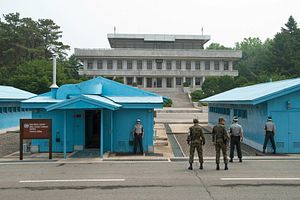A few weeks back, at a time when the minds of most foreign affairs watchers in D.C. were on conflicts in Ukraine and the Middle East, the State Department’s two top diplomats in charge of North Korea policy, Glyn Davies and Robert King, testified in front of the House Foreign Affairs Subcommittee on Asia and the Pacific. At the hearing, Republican committee members, in characteristically pugnacious style, accused the Obama administration of maintaining an ineffectual policy toward the world’s most reclusive and capricious state. Chairman Steve Chabot (R-OH) said in his opening remarks that “a non-nuclear North Korea is an elusive goal if the administration maintains its current strategic trajectory.” Doug Collins (R-GA) went a step further, saying current U.S. policy has “served only to benefit North Korea by offering it more time… to pursue its own objectives.” Even Gerry Connolly (D-VA), normally sympathetic to the White House’s agenda, voiced frustration at the lack of progress made in recent years.
Despite agreeing to abandon its nuclear program in 2005 as part of an accord reached with South Korea, Japan, China, Russia, and the U.S., North Korea disavowed that promise after talks broke down in 2008. Since then, the U.S. government has maintained that North Korea must abide by its 2005 commitment, or else continue to face a crippling sanctions regime and a diplomatic cold shoulder. However, the aggressive lines of questioning by Chabot and others reflect a growing realization that this policy, informally referred to as “strategic patience,” does not adequately address the increasingly brazen threats emanating from the Hermit Kingdom. Indeed, the security situation on the peninsula has only deteriorated in recent years, and all signs indicate that it will continue to do so unless the U.S. revises its stance.
In the last three months or so, the Kim Jong-un regime has detained two American citizens and plans to put them on trial, while refusing to release the ailing Kenneth Bae. Scud missile launches and rocket fire off the DPRK’s coast have become so routine that the commander of U.S. Forces in the Pacific, Admiral Samuel Locklear, warned recently of becoming “numb” to such tests. Perhaps most worryingly, an analysis of satellite imagery conducted by the U.S.-Korea Institute at the Johns Hopkins University showed a flurry of new construction and activity at the Sohae launch site, the country’s primary long-range missile testing facility. Despite these developments, Secretary of State John Kerry said on Meet the Press last month that “North Korea has been quieter” since last year and that denuclearization is “moving forward,” comments that were immediately criticized as unduly sanguine.
While administration officials reject the moniker of “strategic patience” – Glyn Davies, the Special Representative for North Korea policy, said at the House Foreign Affairs hearing that it resembles “a bumper sticker that gets stuck on a car and then just doesn’t get taken off” – it has become something of a flashpoint for critics who say current policy is too passive. Robert Einhorn, the former special adviser to Secretary of State Hillary Clinton on arms control and nonproliferation issues, recently wrote in favor of jettisoning the policy and launching an exploratory dialogue with the North Koreans. While this would entail many risks, he writes that it is “more promising than maintaining the status quo,” which “has not produced better results than previous policies towards North Korea.”
There are many signs that U.S. partners and allies in the region would welcome a cautious diplomatic overture toward North Korea. Japan has already been moving in that direction, making progress on negotiations to resolve the issue of Japanese citizens abducted to North Korea. Relations between the two neighbors could rapidly thaw if a commitment to investigate the issue is implemented smoothly by DPRK authorities, and the Japanese government has pledged to lift certain unilateral sanctions in return. South Korea’s Park Geun-hye is eager not to be left behind by Japan, given that her own olive branches to the North have not yielded fruit. She is also time-limited by the constitution, which allows South Korean presidents only a single five-year term.
Lastly and most importantly, China is frustrated by the lack of traction in its efforts to restart the six-party talks. According to experts such as Alan Romberg of the Stimson Center, many officials there resent what they perceive as unreasonable U.S. demands that they reign in their ally to the South, while the U.S. uses North Korean aggression as a pretext to bolster its security presence on China’s periphery. A conciliatory step toward North Korea may thus contribute to a more trusting Sino-American relationship, and would also send a signal that the U.S. is willing to do some diplomatic heavy lifting and shoulder its share of the strategic risk involved in dealing with the DPRK.
Some observers maintain that a harder-line stance is necessary given the history of North Korean intransigence. Many House members at the aforementioned hearing spoke in favor of further punitive sanctions and against diplomatic engagement without preconditions. But further undermining the DPRK by isolating it economically carries the risk of pushing it closer to China, which would be forced to intervene in order to prevent it from collapsing. As with most problems in international relations, and as U.S. officials are fond of repeating, diplomacy and political negotiations carry the best chances of a durable success.
For the time being however, the Obama Administration appears content to keep the tiller steady. Asked whether there in any discussion of steering North Korea policy in the direction of direct engagement, a State Department spokesperson simply reiterated the longstanding position that while the U.S. “remains committed to pursuing authentic and credible negotiations… the onus is on North Korea to take meaningful actions toward denuclearization and refrain from provocations.”
Elliot Waldman is a journalist based in Washington, D.C., focusing on U.S. foreign policy and East Asian regional affairs.
































